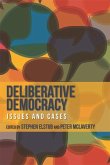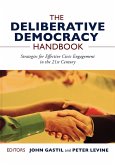CourantThe French Citizens' Convention for Climate
Deliberative Democracy and Ecological Transition
The French Citizens' Convention for Climate
Herausgeber: Courant, Dimitri; Reber, Bernard
CourantThe French Citizens' Convention for Climate
Deliberative Democracy and Ecological Transition
The French Citizens' Convention for Climate
Herausgeber: Courant, Dimitri; Reber, Bernard
- Gebundenes Buch
- Merkliste
- Auf die Merkliste
- Bewerten Bewerten
- Teilen
- Produkt teilen
- Produkterinnerung
- Produkterinnerung
Democracies are struggling to respond to the climate crisis. One promising approach to the ecological transition is based on innovations involving panels of citizens drawn at random. Many countries have experimented with this form of deliberative democracy at national and local levels. These citizens' assemblies formulate public policy proposals. The French Citizens' Convention for Climate is the largest in terms of size, duration and mandate. Thanks to a multi-disciplinary field survey involving around twenty researchers, this book provides an understanding of the complexity of this…mehr
Andere Kunden interessierten sich auch für
![Ecological Politics Ecological Politics]() John RensenbrinkEcological Politics109,99 €
John RensenbrinkEcological Politics109,99 €![Deliberative Democracy Deliberative Democracy]() Deliberative Democracy116,99 €
Deliberative Democracy116,99 €![Denaturalizing Ecological Politics Denaturalizing Ecological Politics]() Andrew BiroDenaturalizing Ecological Politics86,99 €
Andrew BiroDenaturalizing Ecological Politics86,99 €![Deliberative Democracy for the Future Deliberative Democracy for the Future]() Genevieve Fuji JohnsonDeliberative Democracy for the Future78,99 €
Genevieve Fuji JohnsonDeliberative Democracy for the Future78,99 €![Ecological Politics Ecological Politics]() John RensenbrinkEcological Politics59,99 €
John RensenbrinkEcological Politics59,99 €![The Deliberative Democracy Handbook The Deliberative Democracy Handbook]() The Deliberative Democracy Handbook52,99 €
The Deliberative Democracy Handbook52,99 €![Research Methods in Deliberative Democracy Research Methods in Deliberative Democracy]() Research Methods in Deliberative Democracy164,99 €
Research Methods in Deliberative Democracy164,99 €-
-
-
Democracies are struggling to respond to the climate crisis. One promising approach to the ecological transition is based on innovations involving panels of citizens drawn at random. Many countries have experimented with this form of deliberative democracy at national and local levels. These citizens' assemblies formulate public policy proposals. The French Citizens' Convention for Climate is the largest in terms of size, duration and mandate. Thanks to a multi-disciplinary field survey involving around twenty researchers, this book provides an understanding of the complexity of this experience from several angles: procedures and processes; the identity and roles of its members; relationships with expertise and representatives; evaluation and comparison with other cases. Deliberative Democracy and Ecological Transition plays an important role in reflecting on an original practice of democratic innovation and its potential for fair governance of climate policies.
Produktdetails
- Produktdetails
- Verlag: Wiley
- Seitenzahl: 496
- Erscheinungstermin: 26. Juni 2025
- Englisch
- Abmessung: 234mm x 156mm x 27mm
- Gewicht: 866g
- ISBN-13: 9781836690061
- ISBN-10: 1836690061
- Artikelnr.: 74319947
- Herstellerkennzeichnung
- Libri GmbH
- Europaallee 1
- 36244 Bad Hersfeld
- gpsr@libri.de
- Verlag: Wiley
- Seitenzahl: 496
- Erscheinungstermin: 26. Juni 2025
- Englisch
- Abmessung: 234mm x 156mm x 27mm
- Gewicht: 866g
- ISBN-13: 9781836690061
- ISBN-10: 1836690061
- Artikelnr.: 74319947
- Herstellerkennzeichnung
- Libri GmbH
- Europaallee 1
- 36244 Bad Hersfeld
- gpsr@libri.de
Dimitri Courant is a postdoctoral researcher at Harvard University, USA. He holds a double doctorate in political science from the University of Lausanne, Switzerland, and the University of Paris 8, France. He was a postdoctoral Fung Global Fellow at Princeton University, USA. Bernard Reber is a philosopher, specializing in ethics and politics, Director of Research at the CNRS and a member of the Political Research Center at Sciences Po Paris, Cevipof, France. For over two decades, he has analyzed and helped to set up a number of deliberative experiments.
Endorsements xiii
Acknowledgements xv
Introduction xvii
Dimitri COURANT and Bernard REBER
I.1. Deliberative mini-publics, elsewhere and previously xix
I.2. An exceptional scheme xxi
I.3. A cross-disciplinary study to move past an oversimplistic narrative
xxiii
I.4. Presentation of the book xxv
I.5. An atypical field study for a multidisciplinary collective xxxii
I.6. References xxxvi
Part 1. A Complex Deliberative Process 1
Chapter 1. Genesis and Evolution of the Citizens' Convention for Climate 3
Dimitri COURANT
1.1. Precursors and context: the Grand débat national and the citizen group
of the ESEC 4
1.2. A negotiated and hybrid device: between militant lobbying and
political strategy 5
1.3. Modifications and crises 16
1.4. Conclusion 25
1.5. References 25
Chapter 2. Governing Committee and Political Role 29
Jean-Michel FOURNIAU
2.1. Self-government or external leadership of citizens' assemblies 30
2.2. Composition of the governing committee: a political negotiation 33
2.3. Role of the governing committee and scope of autonomy 37
2.4. "Sovereignty" of the Convention 40
2.5. Conclusion: an innovative participatory device or a new form of
democratic representation 42
2.6. References 43
Chapter 3. Comparing Ireland's Citizens' Assembly and France's Citizens'
Convention 47
Dimitri COURANT
3.1. Random selection to the rescue of democracy and ecology 47
3.2. Ireland's Citizens' Assembly: between citizen autonomy and control by
the managers 51
3.3. Comparative analysis with France's Convention: a more partial but more
productive deliberation 59
3.4. Conclusion 69
3.5. Acknowledgements 70
3.6. References 70
Chapter 4. The Pandemic and Conflicts of Legitimacy: Session 6bis 75
Bernard REBER and Nathalie BLANC
4.1. Accelerated improvisation 77
4.2. Influences on the Co-Chairs' and citizens' reactions 82
4.3. Management, selection and cascading votes 87
4.4. Media leak and crisis within the governing committee 93
4.5. Conclusion 95
4.6. References 99
Part 2. Convention Members and Public Opinion 101
Chapter 5. France in Miniature: The Descriptive Legitimacy of the Random
Selection Process 103
Jean-Michel FOURNIAU, Bénédicte APOUEY and Solène TOURNUS
5.1. Initial recruitment of the 150 citizens 104
5.2. Changes in the Convention's composition as it progressed 111
5.3. Sociodemographic characteristics of the participants in the Citizens'
Convention for Climate 113
5.4. Composition of the thematic groups 118
5.5. References 123
Chapter 6. Profiles and Opinions of the Convention Members Compared to
Those of the Population 125
Adrien FABRE, Bénédicte APOUEY, Thomas DOUENNE, Jean-Michel FOURNIAU,
Louis-Gaëtan GIRAUDET, Jean-François LASLIER and Solène TOURNUS
6.1. Introduction 126
6.2. Statistical representativity 128
6.3. Deliberative citizens 145
6.4. The general public's perceptions of the Convention 149
6.5. Conclusion 156
6.6. References 157
Chapter 7. The Convention Members' Opinions on Climate Measures 159
Bénédicte APOUEY, Thomas DOUENNE and Jean-François LASLIER
7.1. Originally, mass support for the measures... with three exceptions 161
7.2. Sociodemography of the support for the climate measures 165
7.3. Perceptions relating to climate change and support for the measures
170
7.4. Trust, life satisfaction, expectations and degree of support for the
measures 174
7.5. Citizens divided on the issue of the carbon tax, from the outset 179
7.6. Evolution of the degree of support for the measures over the course of
the Convention 182
7.7. Conclusion 183
7.8. References 185
Part 3. Deliberations, Proposals and Expertise 187
Chapter 8. Deliberative Impartiality and Legitimacy of the Influences 189
Dimitri COURANT and Simon BAECKELANDT
8.1. Impartiality as a deliberative imperative 191
8.2. Objectivizing impartiality 194
8.3. Around the citizens: politically committed organizers and experts 196
8.4. Evaluating attempts to influence: modes of interaction and legitimacy
199
8.5. Conclusion: proceduralizing impartiality 216
8.6. References 220
Chapter 9. Roles of the Experts and of the Citizens in Devising the
Measures Put Forward: The Thematic Group "Housing" 225
Louis-Gaëtan GIRAUDET and Hélène GUILLEMOT
9.1. Characteristics and issues surrounding "Housing" as a field 226
9.2. Experts and stakeholders 227
9.3. Development and progression of the measures 229
9.4. Role of the citizens, and role of the experts 232
9.5. The measures, and what became of them 235
9.6. Conclusion 238
9.7. References 239
Chapter 10. The Relationships to Expertise in Light of "Technical"
Democracy 241
Selma TILIKETE
10.1. The C3 in line with a dialog-based model? 244
10.2. Acting in a situation of "consensus on the diagnosis" 251
10.3. Expanding the approach to the climate problem 255
10.4. Relaying the experts' proposals, and making them fairer 259
10.5. Conclusion 262
10.6. References 264
Chapter 11. Getting Around the Issue of the "Carbon Tax" 267
Romane ROZENCWAJG, Bénédicte APOUEY, Maxime GABORIT, Laurent JEANPIERRE and
Jean-François LASLIER
11.1. Initial rejection of the "carbon tax" 268
11.2. In search of substitute measures 275
11.3. Conclusion 283
11.4. References 285
Part 4. Social Movements, Justice and Exceptions 287
Chapter 12. Conceptions of Social, Environmental and Climate Justice 289
Nathalie BLANC and Laurence GRANCHAMP
12.1. Definitions of social, environmental and climate justice 291
12.2. Political and organizational frameworks 292
12.3. Debates on social justice in Session 2 of the C3 294
12.4. A step toward environmental and climate justice 299
12.5. Conclusion 303
12.6. References 304
Chapter 13. Contestation and Deliberation: Activists and the Randomly
Selected Citizens 307
Maxime GABORIT
13.1. An organization open to social dynamics 309
13.2. Diversity of interactions between activists and randomly selected
citizens 313
13.3. Moving past the dichotomy between contestation and deliberation 322
13.4. References 324
Chapter 14. Representativity and Exceptionality: Citizens from Overseas and
Co-decision 327
Christiane RAFIDINARIVO
14.1. Dynamics of co-decision on public policy and construction of the
research object 329
14.2. Descriptive representativity and political representation: the
exceptionality of the Overseas Territories 334
14.3. The argument of exceptionality 341
14.4. Conclusion 355
14.5. Acknowledgements 358
14.6. References 359
Part 5. Comparisons, Filters and Accountability 365
Chapter 15. The Bürgerrat Klima: Germany's Informal Model for Integrating
Citizen Deliberation into Politics 367
Rikki DEAN and Gabriel PELLOQUIN
15.1. Bürgerrat Klima's internal characteristics 369
15.2. The Assembly's integrative characteristics 375
15.3. Conclusion 382
15.4. References 384
Chapter 16. Ambiguities of the Phrase "With No Filter" and the Necessary
Filters 387
Bernard REBER
16.1. "With no filter": the ambiguity of a promise 390
16.2. The filters of the Convention 396
16.3. Legal filters 404
16.4. The lacking filters of conceptions of justice 407
16.5. Evaluation of the accountability process 410
16.6. Conclusion: filters as "fictions", necessary for mutual understanding
419
16.7. References 422
Conclusion 427
Bernard REBER
C.1. Evaluation as a conflictive issue: doing better than the GDN 428
C.2. No analysis without descriptive and normative filters 431
C.3. The filters represented by the criteria used, and adherence to them
432
C.4. Justifications of the criteria 433
C.5. Presuppositions 436
C.6. With and beyond Habermasian fiction and Rawlsian conjecture 438
C.7. References 439
List of Authors 443
Index 445
Acknowledgements xv
Introduction xvii
Dimitri COURANT and Bernard REBER
I.1. Deliberative mini-publics, elsewhere and previously xix
I.2. An exceptional scheme xxi
I.3. A cross-disciplinary study to move past an oversimplistic narrative
xxiii
I.4. Presentation of the book xxv
I.5. An atypical field study for a multidisciplinary collective xxxii
I.6. References xxxvi
Part 1. A Complex Deliberative Process 1
Chapter 1. Genesis and Evolution of the Citizens' Convention for Climate 3
Dimitri COURANT
1.1. Precursors and context: the Grand débat national and the citizen group
of the ESEC 4
1.2. A negotiated and hybrid device: between militant lobbying and
political strategy 5
1.3. Modifications and crises 16
1.4. Conclusion 25
1.5. References 25
Chapter 2. Governing Committee and Political Role 29
Jean-Michel FOURNIAU
2.1. Self-government or external leadership of citizens' assemblies 30
2.2. Composition of the governing committee: a political negotiation 33
2.3. Role of the governing committee and scope of autonomy 37
2.4. "Sovereignty" of the Convention 40
2.5. Conclusion: an innovative participatory device or a new form of
democratic representation 42
2.6. References 43
Chapter 3. Comparing Ireland's Citizens' Assembly and France's Citizens'
Convention 47
Dimitri COURANT
3.1. Random selection to the rescue of democracy and ecology 47
3.2. Ireland's Citizens' Assembly: between citizen autonomy and control by
the managers 51
3.3. Comparative analysis with France's Convention: a more partial but more
productive deliberation 59
3.4. Conclusion 69
3.5. Acknowledgements 70
3.6. References 70
Chapter 4. The Pandemic and Conflicts of Legitimacy: Session 6bis 75
Bernard REBER and Nathalie BLANC
4.1. Accelerated improvisation 77
4.2. Influences on the Co-Chairs' and citizens' reactions 82
4.3. Management, selection and cascading votes 87
4.4. Media leak and crisis within the governing committee 93
4.5. Conclusion 95
4.6. References 99
Part 2. Convention Members and Public Opinion 101
Chapter 5. France in Miniature: The Descriptive Legitimacy of the Random
Selection Process 103
Jean-Michel FOURNIAU, Bénédicte APOUEY and Solène TOURNUS
5.1. Initial recruitment of the 150 citizens 104
5.2. Changes in the Convention's composition as it progressed 111
5.3. Sociodemographic characteristics of the participants in the Citizens'
Convention for Climate 113
5.4. Composition of the thematic groups 118
5.5. References 123
Chapter 6. Profiles and Opinions of the Convention Members Compared to
Those of the Population 125
Adrien FABRE, Bénédicte APOUEY, Thomas DOUENNE, Jean-Michel FOURNIAU,
Louis-Gaëtan GIRAUDET, Jean-François LASLIER and Solène TOURNUS
6.1. Introduction 126
6.2. Statistical representativity 128
6.3. Deliberative citizens 145
6.4. The general public's perceptions of the Convention 149
6.5. Conclusion 156
6.6. References 157
Chapter 7. The Convention Members' Opinions on Climate Measures 159
Bénédicte APOUEY, Thomas DOUENNE and Jean-François LASLIER
7.1. Originally, mass support for the measures... with three exceptions 161
7.2. Sociodemography of the support for the climate measures 165
7.3. Perceptions relating to climate change and support for the measures
170
7.4. Trust, life satisfaction, expectations and degree of support for the
measures 174
7.5. Citizens divided on the issue of the carbon tax, from the outset 179
7.6. Evolution of the degree of support for the measures over the course of
the Convention 182
7.7. Conclusion 183
7.8. References 185
Part 3. Deliberations, Proposals and Expertise 187
Chapter 8. Deliberative Impartiality and Legitimacy of the Influences 189
Dimitri COURANT and Simon BAECKELANDT
8.1. Impartiality as a deliberative imperative 191
8.2. Objectivizing impartiality 194
8.3. Around the citizens: politically committed organizers and experts 196
8.4. Evaluating attempts to influence: modes of interaction and legitimacy
199
8.5. Conclusion: proceduralizing impartiality 216
8.6. References 220
Chapter 9. Roles of the Experts and of the Citizens in Devising the
Measures Put Forward: The Thematic Group "Housing" 225
Louis-Gaëtan GIRAUDET and Hélène GUILLEMOT
9.1. Characteristics and issues surrounding "Housing" as a field 226
9.2. Experts and stakeholders 227
9.3. Development and progression of the measures 229
9.4. Role of the citizens, and role of the experts 232
9.5. The measures, and what became of them 235
9.6. Conclusion 238
9.7. References 239
Chapter 10. The Relationships to Expertise in Light of "Technical"
Democracy 241
Selma TILIKETE
10.1. The C3 in line with a dialog-based model? 244
10.2. Acting in a situation of "consensus on the diagnosis" 251
10.3. Expanding the approach to the climate problem 255
10.4. Relaying the experts' proposals, and making them fairer 259
10.5. Conclusion 262
10.6. References 264
Chapter 11. Getting Around the Issue of the "Carbon Tax" 267
Romane ROZENCWAJG, Bénédicte APOUEY, Maxime GABORIT, Laurent JEANPIERRE and
Jean-François LASLIER
11.1. Initial rejection of the "carbon tax" 268
11.2. In search of substitute measures 275
11.3. Conclusion 283
11.4. References 285
Part 4. Social Movements, Justice and Exceptions 287
Chapter 12. Conceptions of Social, Environmental and Climate Justice 289
Nathalie BLANC and Laurence GRANCHAMP
12.1. Definitions of social, environmental and climate justice 291
12.2. Political and organizational frameworks 292
12.3. Debates on social justice in Session 2 of the C3 294
12.4. A step toward environmental and climate justice 299
12.5. Conclusion 303
12.6. References 304
Chapter 13. Contestation and Deliberation: Activists and the Randomly
Selected Citizens 307
Maxime GABORIT
13.1. An organization open to social dynamics 309
13.2. Diversity of interactions between activists and randomly selected
citizens 313
13.3. Moving past the dichotomy between contestation and deliberation 322
13.4. References 324
Chapter 14. Representativity and Exceptionality: Citizens from Overseas and
Co-decision 327
Christiane RAFIDINARIVO
14.1. Dynamics of co-decision on public policy and construction of the
research object 329
14.2. Descriptive representativity and political representation: the
exceptionality of the Overseas Territories 334
14.3. The argument of exceptionality 341
14.4. Conclusion 355
14.5. Acknowledgements 358
14.6. References 359
Part 5. Comparisons, Filters and Accountability 365
Chapter 15. The Bürgerrat Klima: Germany's Informal Model for Integrating
Citizen Deliberation into Politics 367
Rikki DEAN and Gabriel PELLOQUIN
15.1. Bürgerrat Klima's internal characteristics 369
15.2. The Assembly's integrative characteristics 375
15.3. Conclusion 382
15.4. References 384
Chapter 16. Ambiguities of the Phrase "With No Filter" and the Necessary
Filters 387
Bernard REBER
16.1. "With no filter": the ambiguity of a promise 390
16.2. The filters of the Convention 396
16.3. Legal filters 404
16.4. The lacking filters of conceptions of justice 407
16.5. Evaluation of the accountability process 410
16.6. Conclusion: filters as "fictions", necessary for mutual understanding
419
16.7. References 422
Conclusion 427
Bernard REBER
C.1. Evaluation as a conflictive issue: doing better than the GDN 428
C.2. No analysis without descriptive and normative filters 431
C.3. The filters represented by the criteria used, and adherence to them
432
C.4. Justifications of the criteria 433
C.5. Presuppositions 436
C.6. With and beyond Habermasian fiction and Rawlsian conjecture 438
C.7. References 439
List of Authors 443
Index 445
Endorsements xiii
Acknowledgements xv
Introduction xvii
Dimitri COURANT and Bernard REBER
I.1. Deliberative mini-publics, elsewhere and previously xix
I.2. An exceptional scheme xxi
I.3. A cross-disciplinary study to move past an oversimplistic narrative
xxiii
I.4. Presentation of the book xxv
I.5. An atypical field study for a multidisciplinary collective xxxii
I.6. References xxxvi
Part 1. A Complex Deliberative Process 1
Chapter 1. Genesis and Evolution of the Citizens' Convention for Climate 3
Dimitri COURANT
1.1. Precursors and context: the Grand débat national and the citizen group
of the ESEC 4
1.2. A negotiated and hybrid device: between militant lobbying and
political strategy 5
1.3. Modifications and crises 16
1.4. Conclusion 25
1.5. References 25
Chapter 2. Governing Committee and Political Role 29
Jean-Michel FOURNIAU
2.1. Self-government or external leadership of citizens' assemblies 30
2.2. Composition of the governing committee: a political negotiation 33
2.3. Role of the governing committee and scope of autonomy 37
2.4. "Sovereignty" of the Convention 40
2.5. Conclusion: an innovative participatory device or a new form of
democratic representation 42
2.6. References 43
Chapter 3. Comparing Ireland's Citizens' Assembly and France's Citizens'
Convention 47
Dimitri COURANT
3.1. Random selection to the rescue of democracy and ecology 47
3.2. Ireland's Citizens' Assembly: between citizen autonomy and control by
the managers 51
3.3. Comparative analysis with France's Convention: a more partial but more
productive deliberation 59
3.4. Conclusion 69
3.5. Acknowledgements 70
3.6. References 70
Chapter 4. The Pandemic and Conflicts of Legitimacy: Session 6bis 75
Bernard REBER and Nathalie BLANC
4.1. Accelerated improvisation 77
4.2. Influences on the Co-Chairs' and citizens' reactions 82
4.3. Management, selection and cascading votes 87
4.4. Media leak and crisis within the governing committee 93
4.5. Conclusion 95
4.6. References 99
Part 2. Convention Members and Public Opinion 101
Chapter 5. France in Miniature: The Descriptive Legitimacy of the Random
Selection Process 103
Jean-Michel FOURNIAU, Bénédicte APOUEY and Solène TOURNUS
5.1. Initial recruitment of the 150 citizens 104
5.2. Changes in the Convention's composition as it progressed 111
5.3. Sociodemographic characteristics of the participants in the Citizens'
Convention for Climate 113
5.4. Composition of the thematic groups 118
5.5. References 123
Chapter 6. Profiles and Opinions of the Convention Members Compared to
Those of the Population 125
Adrien FABRE, Bénédicte APOUEY, Thomas DOUENNE, Jean-Michel FOURNIAU,
Louis-Gaëtan GIRAUDET, Jean-François LASLIER and Solène TOURNUS
6.1. Introduction 126
6.2. Statistical representativity 128
6.3. Deliberative citizens 145
6.4. The general public's perceptions of the Convention 149
6.5. Conclusion 156
6.6. References 157
Chapter 7. The Convention Members' Opinions on Climate Measures 159
Bénédicte APOUEY, Thomas DOUENNE and Jean-François LASLIER
7.1. Originally, mass support for the measures... with three exceptions 161
7.2. Sociodemography of the support for the climate measures 165
7.3. Perceptions relating to climate change and support for the measures
170
7.4. Trust, life satisfaction, expectations and degree of support for the
measures 174
7.5. Citizens divided on the issue of the carbon tax, from the outset 179
7.6. Evolution of the degree of support for the measures over the course of
the Convention 182
7.7. Conclusion 183
7.8. References 185
Part 3. Deliberations, Proposals and Expertise 187
Chapter 8. Deliberative Impartiality and Legitimacy of the Influences 189
Dimitri COURANT and Simon BAECKELANDT
8.1. Impartiality as a deliberative imperative 191
8.2. Objectivizing impartiality 194
8.3. Around the citizens: politically committed organizers and experts 196
8.4. Evaluating attempts to influence: modes of interaction and legitimacy
199
8.5. Conclusion: proceduralizing impartiality 216
8.6. References 220
Chapter 9. Roles of the Experts and of the Citizens in Devising the
Measures Put Forward: The Thematic Group "Housing" 225
Louis-Gaëtan GIRAUDET and Hélène GUILLEMOT
9.1. Characteristics and issues surrounding "Housing" as a field 226
9.2. Experts and stakeholders 227
9.3. Development and progression of the measures 229
9.4. Role of the citizens, and role of the experts 232
9.5. The measures, and what became of them 235
9.6. Conclusion 238
9.7. References 239
Chapter 10. The Relationships to Expertise in Light of "Technical"
Democracy 241
Selma TILIKETE
10.1. The C3 in line with a dialog-based model? 244
10.2. Acting in a situation of "consensus on the diagnosis" 251
10.3. Expanding the approach to the climate problem 255
10.4. Relaying the experts' proposals, and making them fairer 259
10.5. Conclusion 262
10.6. References 264
Chapter 11. Getting Around the Issue of the "Carbon Tax" 267
Romane ROZENCWAJG, Bénédicte APOUEY, Maxime GABORIT, Laurent JEANPIERRE and
Jean-François LASLIER
11.1. Initial rejection of the "carbon tax" 268
11.2. In search of substitute measures 275
11.3. Conclusion 283
11.4. References 285
Part 4. Social Movements, Justice and Exceptions 287
Chapter 12. Conceptions of Social, Environmental and Climate Justice 289
Nathalie BLANC and Laurence GRANCHAMP
12.1. Definitions of social, environmental and climate justice 291
12.2. Political and organizational frameworks 292
12.3. Debates on social justice in Session 2 of the C3 294
12.4. A step toward environmental and climate justice 299
12.5. Conclusion 303
12.6. References 304
Chapter 13. Contestation and Deliberation: Activists and the Randomly
Selected Citizens 307
Maxime GABORIT
13.1. An organization open to social dynamics 309
13.2. Diversity of interactions between activists and randomly selected
citizens 313
13.3. Moving past the dichotomy between contestation and deliberation 322
13.4. References 324
Chapter 14. Representativity and Exceptionality: Citizens from Overseas and
Co-decision 327
Christiane RAFIDINARIVO
14.1. Dynamics of co-decision on public policy and construction of the
research object 329
14.2. Descriptive representativity and political representation: the
exceptionality of the Overseas Territories 334
14.3. The argument of exceptionality 341
14.4. Conclusion 355
14.5. Acknowledgements 358
14.6. References 359
Part 5. Comparisons, Filters and Accountability 365
Chapter 15. The Bürgerrat Klima: Germany's Informal Model for Integrating
Citizen Deliberation into Politics 367
Rikki DEAN and Gabriel PELLOQUIN
15.1. Bürgerrat Klima's internal characteristics 369
15.2. The Assembly's integrative characteristics 375
15.3. Conclusion 382
15.4. References 384
Chapter 16. Ambiguities of the Phrase "With No Filter" and the Necessary
Filters 387
Bernard REBER
16.1. "With no filter": the ambiguity of a promise 390
16.2. The filters of the Convention 396
16.3. Legal filters 404
16.4. The lacking filters of conceptions of justice 407
16.5. Evaluation of the accountability process 410
16.6. Conclusion: filters as "fictions", necessary for mutual understanding
419
16.7. References 422
Conclusion 427
Bernard REBER
C.1. Evaluation as a conflictive issue: doing better than the GDN 428
C.2. No analysis without descriptive and normative filters 431
C.3. The filters represented by the criteria used, and adherence to them
432
C.4. Justifications of the criteria 433
C.5. Presuppositions 436
C.6. With and beyond Habermasian fiction and Rawlsian conjecture 438
C.7. References 439
List of Authors 443
Index 445
Acknowledgements xv
Introduction xvii
Dimitri COURANT and Bernard REBER
I.1. Deliberative mini-publics, elsewhere and previously xix
I.2. An exceptional scheme xxi
I.3. A cross-disciplinary study to move past an oversimplistic narrative
xxiii
I.4. Presentation of the book xxv
I.5. An atypical field study for a multidisciplinary collective xxxii
I.6. References xxxvi
Part 1. A Complex Deliberative Process 1
Chapter 1. Genesis and Evolution of the Citizens' Convention for Climate 3
Dimitri COURANT
1.1. Precursors and context: the Grand débat national and the citizen group
of the ESEC 4
1.2. A negotiated and hybrid device: between militant lobbying and
political strategy 5
1.3. Modifications and crises 16
1.4. Conclusion 25
1.5. References 25
Chapter 2. Governing Committee and Political Role 29
Jean-Michel FOURNIAU
2.1. Self-government or external leadership of citizens' assemblies 30
2.2. Composition of the governing committee: a political negotiation 33
2.3. Role of the governing committee and scope of autonomy 37
2.4. "Sovereignty" of the Convention 40
2.5. Conclusion: an innovative participatory device or a new form of
democratic representation 42
2.6. References 43
Chapter 3. Comparing Ireland's Citizens' Assembly and France's Citizens'
Convention 47
Dimitri COURANT
3.1. Random selection to the rescue of democracy and ecology 47
3.2. Ireland's Citizens' Assembly: between citizen autonomy and control by
the managers 51
3.3. Comparative analysis with France's Convention: a more partial but more
productive deliberation 59
3.4. Conclusion 69
3.5. Acknowledgements 70
3.6. References 70
Chapter 4. The Pandemic and Conflicts of Legitimacy: Session 6bis 75
Bernard REBER and Nathalie BLANC
4.1. Accelerated improvisation 77
4.2. Influences on the Co-Chairs' and citizens' reactions 82
4.3. Management, selection and cascading votes 87
4.4. Media leak and crisis within the governing committee 93
4.5. Conclusion 95
4.6. References 99
Part 2. Convention Members and Public Opinion 101
Chapter 5. France in Miniature: The Descriptive Legitimacy of the Random
Selection Process 103
Jean-Michel FOURNIAU, Bénédicte APOUEY and Solène TOURNUS
5.1. Initial recruitment of the 150 citizens 104
5.2. Changes in the Convention's composition as it progressed 111
5.3. Sociodemographic characteristics of the participants in the Citizens'
Convention for Climate 113
5.4. Composition of the thematic groups 118
5.5. References 123
Chapter 6. Profiles and Opinions of the Convention Members Compared to
Those of the Population 125
Adrien FABRE, Bénédicte APOUEY, Thomas DOUENNE, Jean-Michel FOURNIAU,
Louis-Gaëtan GIRAUDET, Jean-François LASLIER and Solène TOURNUS
6.1. Introduction 126
6.2. Statistical representativity 128
6.3. Deliberative citizens 145
6.4. The general public's perceptions of the Convention 149
6.5. Conclusion 156
6.6. References 157
Chapter 7. The Convention Members' Opinions on Climate Measures 159
Bénédicte APOUEY, Thomas DOUENNE and Jean-François LASLIER
7.1. Originally, mass support for the measures... with three exceptions 161
7.2. Sociodemography of the support for the climate measures 165
7.3. Perceptions relating to climate change and support for the measures
170
7.4. Trust, life satisfaction, expectations and degree of support for the
measures 174
7.5. Citizens divided on the issue of the carbon tax, from the outset 179
7.6. Evolution of the degree of support for the measures over the course of
the Convention 182
7.7. Conclusion 183
7.8. References 185
Part 3. Deliberations, Proposals and Expertise 187
Chapter 8. Deliberative Impartiality and Legitimacy of the Influences 189
Dimitri COURANT and Simon BAECKELANDT
8.1. Impartiality as a deliberative imperative 191
8.2. Objectivizing impartiality 194
8.3. Around the citizens: politically committed organizers and experts 196
8.4. Evaluating attempts to influence: modes of interaction and legitimacy
199
8.5. Conclusion: proceduralizing impartiality 216
8.6. References 220
Chapter 9. Roles of the Experts and of the Citizens in Devising the
Measures Put Forward: The Thematic Group "Housing" 225
Louis-Gaëtan GIRAUDET and Hélène GUILLEMOT
9.1. Characteristics and issues surrounding "Housing" as a field 226
9.2. Experts and stakeholders 227
9.3. Development and progression of the measures 229
9.4. Role of the citizens, and role of the experts 232
9.5. The measures, and what became of them 235
9.6. Conclusion 238
9.7. References 239
Chapter 10. The Relationships to Expertise in Light of "Technical"
Democracy 241
Selma TILIKETE
10.1. The C3 in line with a dialog-based model? 244
10.2. Acting in a situation of "consensus on the diagnosis" 251
10.3. Expanding the approach to the climate problem 255
10.4. Relaying the experts' proposals, and making them fairer 259
10.5. Conclusion 262
10.6. References 264
Chapter 11. Getting Around the Issue of the "Carbon Tax" 267
Romane ROZENCWAJG, Bénédicte APOUEY, Maxime GABORIT, Laurent JEANPIERRE and
Jean-François LASLIER
11.1. Initial rejection of the "carbon tax" 268
11.2. In search of substitute measures 275
11.3. Conclusion 283
11.4. References 285
Part 4. Social Movements, Justice and Exceptions 287
Chapter 12. Conceptions of Social, Environmental and Climate Justice 289
Nathalie BLANC and Laurence GRANCHAMP
12.1. Definitions of social, environmental and climate justice 291
12.2. Political and organizational frameworks 292
12.3. Debates on social justice in Session 2 of the C3 294
12.4. A step toward environmental and climate justice 299
12.5. Conclusion 303
12.6. References 304
Chapter 13. Contestation and Deliberation: Activists and the Randomly
Selected Citizens 307
Maxime GABORIT
13.1. An organization open to social dynamics 309
13.2. Diversity of interactions between activists and randomly selected
citizens 313
13.3. Moving past the dichotomy between contestation and deliberation 322
13.4. References 324
Chapter 14. Representativity and Exceptionality: Citizens from Overseas and
Co-decision 327
Christiane RAFIDINARIVO
14.1. Dynamics of co-decision on public policy and construction of the
research object 329
14.2. Descriptive representativity and political representation: the
exceptionality of the Overseas Territories 334
14.3. The argument of exceptionality 341
14.4. Conclusion 355
14.5. Acknowledgements 358
14.6. References 359
Part 5. Comparisons, Filters and Accountability 365
Chapter 15. The Bürgerrat Klima: Germany's Informal Model for Integrating
Citizen Deliberation into Politics 367
Rikki DEAN and Gabriel PELLOQUIN
15.1. Bürgerrat Klima's internal characteristics 369
15.2. The Assembly's integrative characteristics 375
15.3. Conclusion 382
15.4. References 384
Chapter 16. Ambiguities of the Phrase "With No Filter" and the Necessary
Filters 387
Bernard REBER
16.1. "With no filter": the ambiguity of a promise 390
16.2. The filters of the Convention 396
16.3. Legal filters 404
16.4. The lacking filters of conceptions of justice 407
16.5. Evaluation of the accountability process 410
16.6. Conclusion: filters as "fictions", necessary for mutual understanding
419
16.7. References 422
Conclusion 427
Bernard REBER
C.1. Evaluation as a conflictive issue: doing better than the GDN 428
C.2. No analysis without descriptive and normative filters 431
C.3. The filters represented by the criteria used, and adherence to them
432
C.4. Justifications of the criteria 433
C.5. Presuppositions 436
C.6. With and beyond Habermasian fiction and Rawlsian conjecture 438
C.7. References 439
List of Authors 443
Index 445








